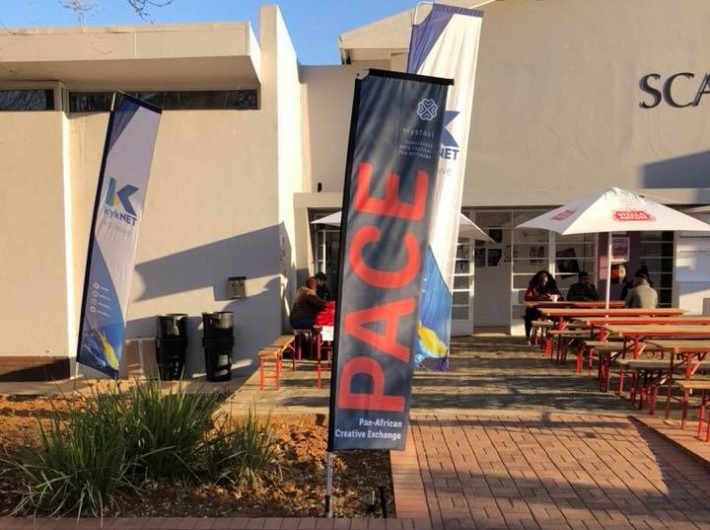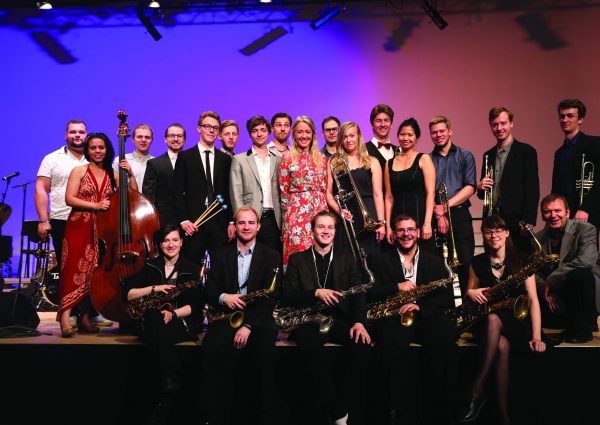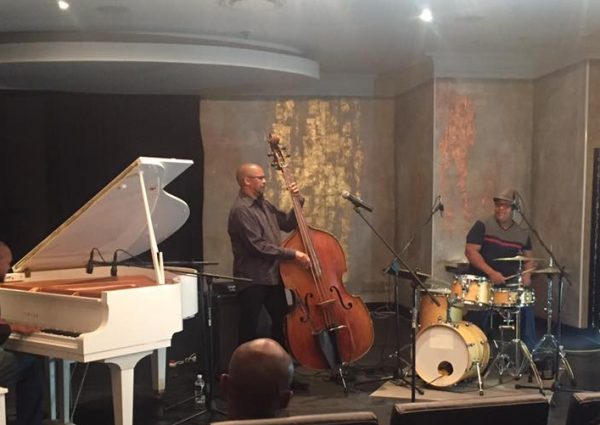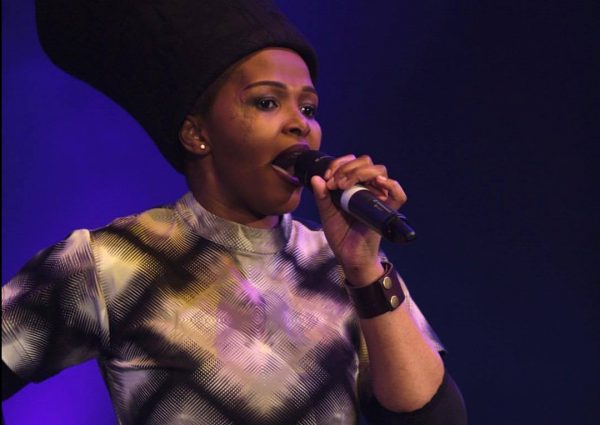The Pan-African Creative Exchange (PACE) opened the week-long Free State Arts Festival with a bang, ART STATE publisher Mpho Matsitle reports.
The five kilometre ride from the State House to the University of the Free State, where the annual Free State Arts Festival (VryFees) is held, is not one that you’d usually regret. Less so on a cool, clear and bright Bloemfontein Saturday afternoon. This is a weather that demands nothing more than to chill – and we people of small cities are experts at the art of chilling.
It is with this chill that I rode gingerly into the main gate of the well-manicured university. Despite the preparation for one of the biggest festivals in the country, the environment is chilled. Where you’d expect the hustle and bustle of set-up operations, everyone is just doing what needs to be done in an assuring chilled manner. There’s no loud shouting, no one is running to and fro, nor anything breaking. The grass is green all round, some trees are bare and some stubbornly hang on to their leaves despite the season demanding otherwise. The VryFees posters too hang tightly to the poles, albeit one can see some wear and tear from the gusts of wind that have accompanied the cold fronts that visited the city from the south. From the north and all other directions the visitors comprise of artists, art organisers, art activists, art academics, art [insert title], who are the early birds of the festival. They are gathered for what is billed to be “an interdisciplinary (performing) arts provocation” three day imbizo called Pan-African Creative Exchange (PACE).
Only in its inaugural year, one cannot but be amazed by the power it packs when comparing its brochure to the rest of the festival. Or maybe it’s just a question of rumo ja ntlha moloi? Well, time will tell.
PACE, taking place over the first weekend of the VryFees with no other events taking place, threatens to be the sort of appetiser so good one might over-indulge, leaving no room for the main meal. As such it is imperative that one paces themselves.
The four day programme that runs from dawn to dusk with over 30 productions and presentations from all over Africa including Egypt, Namibia, Nigeria, Ghana, Uganda, Rwanda, Senegal, South Africa and Zimbabwe. On this chilled Saturday, Art State managed to catch the delegates during their lunch hour. Rea Mokone, PACE Administrative Assistant, was hard at work making sure all the delegates are well taken care of (Traumerei chef Johan had prepared a scrumptious two-course buffet). Claiming fatigue but looking nothing of the sort, she took time to launch a well-rehearsed sales pitch for PACE (which is of course no sweat for the talented rapper-poet). She took me through all the big guns who are part of the programme from all over the world.
After lunch VryFees director Ricardo Peach marshalled us to the auditorium currently called Albert Wessels Auditorium (AWO) for a presentation and two performances. AWO made piss of my earlier objections to the price of thermal vests. However, cold as it was, the three showcases that took place therein made the impending pneumonia a small price to pay.
First up was Nigerian dancer and choreographer Qudus Onikeku who joined in via Skype. Ricardo mentioned something about VISA issues being the enemy of progress (cue Kgosietsile’s No Serenity Here). Quite telling of our state as a continent that an African can’t freely traverse his homeland. With the intermittent squealing of his twin babies in the background, Qudus engaged us on his project Spirit Child, a performance inspired by Ben Okri’s Azaro from his seminal title The Famished Road. Spirit Child, Qudus informed us, is part of his MO of interpreting African literature and philosophy through dance. Decrying the lack of a deep well of “African contemporary dance” (something he says he has no idea what it even means) body of work in Nigeria, he goes digging in Yoruba culture, Nigerian literary giants such as Achebe and Tautola, and musical geniuses such as Fela Kuti for inspiration. Something he has in common with South African über-composer and librettist Neo Muyanga, who is an artist Qundus – responding to the provocation from Ricardo – said he’d most like to collaborate with.
Almost as if finishing off Qudus’ train of thought on hip hop as coming to define African contemporary dance, Senegalese dancer and choreographer Abdoulaye Diallo showcased his three-month old dance masterpiece Pollution. Backed with poetry and music, Abdoulaye’s rousing performance illustrated the earth in agony due to pollution, particularly litter. But beyond that proved once again that art is and can be a conduit to social change, social inclusion and a clean environment. As he put it, “when people are happy and entertained they listen.” He stated that the use of the hip hop aesthetic to drive home this message is a deliberate ploy to reach the youth of Africa.
This hip hop aesthetic was again brilliantly employed in Hani: The Legacy – a full length theatre showcase from the Market Theatre that closed off day two of PACE at the kykNET Scaena Theatre. Before seeing this play it might be impossible for one to imagine Hani and hip hop and bling in one sentence, especially considering that Molemi once claimed “were he alive you’d never rock Armani.” But it is the role of good art to make the unthinkable palpable. Thembisile Hani, Limpho Hani, Rolihlahla Mandela et al. were all involved in various rap battles and dance offs in this daring ingenious production. Another moment of ingenuity was the seamless transition from amagwijo to hip hop through the device of the djembe drum, vindicating Zubz’s claim in Fire Song that “hip hop started right here on the African continent, the home of the drum, the birthplace of rhythm itself.”
HipHopFreaks also took ownership of hip hop with their showcase Greet die Hele Land at the ATKV Boeke Oase Tent in the penultimate show of the day. Preceding them was Asanda Mqiki’s trio who performed hits from Asanda’s hot-off-press jazz album Nobakithi. One thing for sure is that Asanda, whose versatile voice scatters the demons away every time she scats, is well and ready to etch her name into the list of young hip jazz maestros, such as Kyle Shephered, Linda Ntuli and Nduduzo Makhathini, doing the Lord’s work of disabusing many of the notion that jazz is just a country of old men in Brentwoods.
The pick of the litter for this jam-packed day was definitely Wezile Mgibe’s bride/groom ghost-like image through which he carries the stories and souls of the wretched of the earth. This harrowing provocation, titled In These Streets, took place entirely backstage – a restricted space Wezile invited the audience to trespass, invade and occupy; something that the marginalized whose stories he embodies through this apparition constantly have to do. The curious followed this person dressed in a tatty wedding gown and blazer around the backstage with mounting suspense. The bride/groom’s head was covered in bandage, a symbol of the much-need healing given that, as Wezile put it later in the Q&A, “Africa is a crime scene.” Some quit early on as ‘nothing was happening’ – but this nothing was part of the story. Nothing happens in the lives of the people living in these streets that Wezile engaged to collate this their narrative. They live completely arid lives. The audience that stayed the course did not however fare any better than those who left, as they did not know how to watch or react to the showcase, whether to be participants or voyeurs, or to laugh or be scared. And there lay Wezile’s genius; as it is in life when faced with the downtrodden, there were no easy answers, never mind right ones. For in truth the only ethical answer to a scourge such as homelessness is that there should be no homelessness.
PACE closes tonight with the Vuyani Dance Theatre’s production Cion at the theatre currently called Sand du Plessis at PACOFS. The VryFees goes full gear from today, and if the past Saturday is anything to go by, the one advice I can offer is that pace yourself – it’s going to be one heck of a ride!
Mpho Matsitle is the co-writer of White Star Liner taking place at the VryFees on 12 July 2018.
Featured image credit: Ricardo Peach (Facebook)






